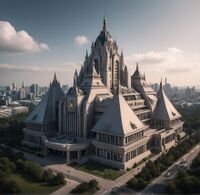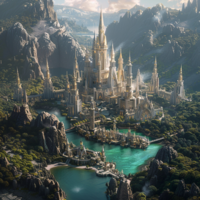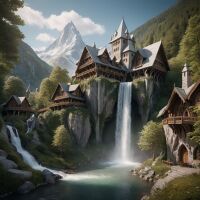Tiami
The Alfar Imperium of Amador Imperium Amadore | |
|---|---|
| Motto: "Dulce et decorum est pro patria mori" | |
| Anthem: The Call of Nature | |
| Capital | Ifa Serine |
| Largest city | Citadel |
| Official languages | Alfarian |
| Recognised national languages | Alfar, English |
| Ethnic groups |
|
| Demonym(s) | Amadorian |
| Government | Absolute Monarchy |
• Queen | Maeralya Amador |
• King | Ailred Fasandoral |
| Aleriel Saelihn | |
| Alonsir Balatak | |
| Legislature | Imperial Senate |
| Chamber of Representatives | |
| Chamber of Commons | |
| History | |
• Pre-History | Circa 25000 BCE |
• Kingdom of Tiami | 25000 BCE - 4200 BCE |
• Kingdom of Hath Teliel | 4200 BCE - 1472 BCE |
• First Kingdom of Amador | 1472 BCE - 1001 CE |
• Imperium of Amador | 1001 CE - Present |
| Area | |
• Total | 19,551,400 km2 (7,548,800 sq mi) |
• Water (%) | 13.12% |
| Population | |
• 2024 census | 31,278,384,997 |
• Density | 118.54/km2 (307.0/sq mi) |
| GDP (PPP) | 2024 estimate |
• Total | $2,287 Trillion |
• Per capita | $73,117 |
| GDP (nominal) | 2024 estimate |
• Total | $2,093 Trillion |
• Per capita | $66,915 |
| Gini | 25.325 low |
| HDI | 0.972 very high |
| Currency | Aeures (₳) |
| Time zone | Gothic Central-West Time (GCT+8) |
| Date format | dd-mm-yy |
| Driving side | right |
| Internet TLD | .alk |
The Alfar Imperium of Amador (Latin: Imperium Amadore), commonly known as 'Amador', is a Gothic Elven Empire ruled by the House of Amador, mainly situated across the South-Central area of Gholgoth on the Alfar Peninsula. Amador shares a southern land border with the Saahein Sovereignty, a maritime border with the Drakonium Imperium, and a maritime border with the Scandinvan. The Imperium comprises of numerous overseas territories, including Kva Norale in the Badlands, and Eska Alfaria in Greater Dienstad as well as the Alfar Isles in the Levanora Vastness. It maintains positive relations with Amaldorei, a city-state in Esvanovia which was once a colonial possession of the Imperium. Amador is currently headed by Maeralya Amador. An Imperial power, Amador is a highly developed country. With over 30 billion people residing in the nation, it is one of the most populous nations in Gholgoth. Three-fourths of the population resides in the northern areas of the country, where the land is flat and fertile. The capital is Ifa Serine and the largest city of Amador is Citadel, followed by Enas Shaereth, He'kir, and Naeth Aethel.
Amador is an empire ruled by elves,, though there retains a sizable population of humans and other non-human species. A proud race with a history spanning millennia, the modern working-class elf, aside from their pointed ears, are almost completely biologically and anatomically identical to modern humans. The Royal Family of Amador are one such example of a pure-blood elven lineage left in Amador who retain their immortality. The current monarch, Maeralya, has sat the Eternal Throne for three thousand years. The royal family, alongside noble houses posses magic. Alfar typically have promise in the magic arts, with magic being heavily practiced int he Imperium. Amador also possesses advanced technologies, with one such example being the Holocron, a near indefinite storage device used for literary storage. Pureblood Alfar are capable of bonding with dragon, winged reptiles capable of breathing fire. Dragonlords, often heads of noble houses, are known for their prominent displays of dragon riding.
Amador is a regional center for science, art, philosophy, and greater education, hosting many of the region's most prestigious universities. The nation is home to some of the most visited heritage sites in Gholgoth. It is among the most visited nations in the region when adjusted for international visits. The nation is highly develop, maintaining a high nominal per capita income despite being economically dwarfed in size by most of the region. Amador is renowned for it's reusable energy programs and lush, verdant forests. Amador's armed forces defend its sovereignty and are among the most technologically powerful in the region to compensate for its smaller size in comparison to its regional neighbors. The Imperium maintains close political, economic, and military ties with the Saahein Sovereignty.
Etymology
History
The Alfar Imperium is but one of the countless names Amador has undertaken throughout its history. A nation of elves, Amador has a nearly impossibly long history, with archaeological records suggesting the earliest Alfar civilizations to have existed around twenty millennia ago. Some records suggest records going back as far as 24,000 BCE. Amador has a long and complicated history, stretching numerous millennia and sharing its history with dozens of nations throughout the course of Amador's history, with notable inclusion with the Saahein Sovereignty, and Holy Marsh.
The Imperium initially started out as a collection of villages and towns along the Amas River, where modern Ifa Serine rests. Ifa Serine was the first Alfar population center to be considered a city and has served as the nation's capital since time immemorial. The first kingdoms, often called Tiami, were the oldest and most prominent of ancient tribes and the precursors of the modern Amadors, the royal family of the Imperium.
The Kingdom of Tiami
The Kingdom of Tiami was the first and oldest continuously operating kingdom of Old Amador, formed at least ten thousand years ago and with archaeological records going back to 25,0000 BCE. Known prominently as the 'Old Kingdom', Tiami was formed around the Jaah'heer Harbor where Ifa Serine is located.
Much of Amador's early history is lost, with very few Alfar from the time period still living, including the queen, Maeralya Amador. Tiami was known for its building prowess and establishing the structure of the government. A unified kingdom was officially established in 7300 BCE by King Alastar Vorshiel, which led to a series of ruling houses, most extensively featuring the Vorshiel Royal Family, a now Great House in the modern era. The Tiami kingdom ruled at least until 4200 BCE, where the Hath Teliel Kingdom would come to power.
Fall of Tiami
By 4300 BCE, the Kingdom began to splinter and split into several rump states following internal strife, plague, and weak governance. The Herokon Split, a revolution led by the House of Hath Teliel starting in 4300 BCE, saw the Tiami Kingdom officially overthrown following a series of brutual civil wars that deposed the then-king Idinor. This century of conflict was known as the Dark Century
The Kingdom of Hath Teliel
The Kingdom of Hath Teliel begun in 4307 BC following the Dark Century, a century-long civil war that erupted following the Tiamianian peasant uprisings. The uprisings, brought about by the highly oppressive rule of the Tiami, crippled the Kingdom, effectively reducing it in power over a period of century in which it wasted away. The century was seen as a blighted time. Plague and famine decimated much of the Tiami's populace. While the Kingdom ultimately put the civil war down, the bloodshed and economic issues were highly prevalent, leading to the inevitable downfall of the First Elven Kingdom.
Hath Teliel would assume control of the Kingdom by infiltrating the Eternal Palace in Ifa Serine and murdering the entirety of the ruling family. The King of Tiami at the time, Tiamius Glordius, was brutally executed with his head placed firmly on a pike in the main square of Ifa Serine. Olymphar Hath Teliel, the former general and loyal soldier of Tiami was responsible for the murder of the royal family. When his involvment became known, he was cheered relentless. So much so that he was declared King of Tiami, thus establishing the Hathien Royal House. Not wishing to be compared to Tiami, he declared the new dynasty as "The Kingdom of Hath Teliel" His new subjects would hence be called 'Hathiens' instead of Tiamians. A purge of royal Tiamians would commence, effectively causing the extinct of the House, though in modern times, the House of Amador traces its lineage back to the Tiami of old.
As King, Olymphar would rule his new kingdom for one hundred years before falling during the Elderin Campaigns, a series of expansionist campaigns on the peninsula against the Elderin Elves, a separate sect of Amadorian elves that diverged from the founding of the Kingdom. The initial campaigns ultimately ended in failure following the loss of King Olymphar. King Olymphar would be succeeded by his son, Perigridel Hath Teliel following his death. As his first order of business, he successfully negotiated a peace between to two sects of Elves.
The new King would enact a series of social reforms, giving new freedoms to the peasant and merchant class civilians, expanding food storage and distribution methods, and enacting a series of large-scale infrastrcuture projects. Included were the first walled cities and stone-paved highways for the transportation of goods and military forces. It was also around this time that the Hathiens encountered dragons for the first time. Upon learning how to tame and bond with the flame-breathing creatures, the Hathien Royal Family would be without challenge for nearly two millennia. The Hathien Armies would adopt the first Dragonback Corps. In 3,023 BC, King Perigridel would renew the Elderin Campaigns with dragons laying waste to Elderin settlements, razing their cities and decimating their armies. Following a brutal series of coastal sackings, the Elderin King, Joriel, would surrender. His house would be dismembered, his family executed, and his kingdom incorporated into the Kingdom of Hath Teliel.
King Perigridel, following the triump over the Elderins, set his sight towards the vast oceans. Building vast sea-worthy vessels capable of transporting dragons, he ordered his people to explore the oceans in search of new lands, knowledge, and to share in the wealth of Hath Teliel. It is said during this time that the King was searching for lost information on the Great Phoenix, as to ascertain his desire to achieve divinity. It was during one such expediton circa 3010-3000 BC that Hathien elves encountered the then-barbaric creatures of what would become known as the Holy Marsh.
Expeditions in Holy Marsh
In the region of Greater Dienstad in a continent then known as Erasmus to the Elves of Amador, an expedition led by Altherion Vantoril encountered a wide range of native tribespeople. Most of these tibes were passed by the Elves, who marked the traditions of the people and the geography of the land in an academic and relatively disinterested fashion. When the badlands transitioned to mountains and those mountains to the jungle, however, the tenor of the expedition changed.
Darwe Mathetel, lead scout, encountered native tribespeople. Friendly contact was achieved despite the lack of language, and the expedition moved to make a broader connection. There they discovered the Jhanjotra and Birangar tribes located in a small but growing settlement at a mountain pass, where the jungle and badlands met. In the location where modern Mar’si now stands and where the First Cathedral was then being made, the Elves made note of the fervent belief in Marshism and the ways and traditions of the odds tribes. Other tribes such as the Sarangdev, Yuana, and Kehrola were in the midst of conversion to the faith, and Perigridel Hath Teliel even took part in the viewing of the election and confirmation of the third Arsi’Elkon.
The expedition would spend several years in the Hitlion region as the Marshites grew. Contact was established early thanks to magic- the Elves were surprised to discover Marshite ‘Bhagatveer’ Shaman-Poets who were capable of bridging the gap. Still, the Elves were able to impress early Marshites with their advanced technologies and proof of near immortality and mastery of dragons, a feat the elves shared with upon the ancestral Marshites.
The Elves were for their part impressed with how well Marshites adapted as well as the variance of their people. Altherion Vantoril was noted as saying: “We have yet to encounter a barbarian people as diverse as they. They welcome all and ask only faith. This faith must be strong, for as deep and passionate their debates are and as ready as we have been to see them fall upon each other, they pull themselves away in respect and reverence long before."
In modern times, the tales of the first expedition are enshrined in the Codex Mar'si, a scroll that also contained a series of government structures in relaion to the Kerdan Council and national unity all written in Marshite and Amadorian dialects. Darwe Mathetel acts as curator at the National Museum of Elven History, thus focusing on maintaining the aged document.
Fall of Hath Teliel
In 1450 BC, following a series of famines, the Kingdom begun to fracture, with peasant uprisings once again becoming the forefront of Hathien politics.
1st Kingdom of Amador
Fall of the 1st Kingdom
Scandin Occupations
Amadorian Revolution
2nd Kingdom of Amador
Renewed Expeditions
Rise of the Void Elves
Rise of Amador
Ascension of Maeralya Amador
Contemporary
At the turn of the century, Amador found itself embroiled in the War of the Leaves, a rebellion in Seclya led by Ruven Rothilion to overthrown the Hakul government and grant its Elven inhabitants freedom. The Altos Lease Act was passed through the Imperial Senate, granting Amadorian financial and military equipment aid. During the course of the first year of the war, Lady Issarel Ermy became an advocate for involvement of the Imperium in Seclya, whereupon the nation finally relented.
The involvement of Amadorian forces were stated to have been a significant contribution to the eventual rise of the Saahein Sovereignty. Throughout the war, Selcyan-Amadorian forces were able to systemically destroy the former government positions. The ending of the war saw the rise of the elven-dominated Saahein Sovereignty, a stalwart ally of Amador's into the modern age.
Geography
The Imperium of Amador is a large country by both land and total area. A peninsular nation, Amador shares a sea border with the Scandinvans via their islands of Vismer. Amador also shares a southern land border with Brewdomia. Southern Amador itself is largely mountainous or rolling hills, whereas central Amador is heavily forested by the Godswood trees. Flat, fertile plains stretch throughout much of Amador's northern half.
The Glypheral Mountain Range staddles much of Amador's southern border and southwestern coast. Mt. Olmhyphar, at 18,596 ft., is the tallest mountain in all of Amador and the Glypherals. Plentiful mountain lakes straddle the mountain range, allowing for inhabited life to manage. The Glypherial Mountain Range is home to several extinct volcanoes, including Mt. Killaltel, at 17,493 ft., thus making it the tallest volcano in Amador.
There are many lakes in Amador; the largest being Lake Oraclien. The vast majority of Amador's population is situated in northern and coastal Amador. These areas, largely flat, coastal, or rolling plain, are highly fertile. Amadorian wheat fields litter northern Amador, and are often considered a natural wonder in their own right due to how much farmland there is. Lake Oraclien provides one-fifths of the nations water needs.
The Encuriel River, Amador's longest river, stretches from the Glypheral Mountain all the way to He'kir at the northern tip of Amador, where its delta empties into the Narrows. Largely considered the national river of Amador, the Encuriel is also considered the longest river in Gholgoth. The Encuriel also feeds and nourishes the vast Godswood forest of central Amador, leading to mature Godswood capable of reaching well over four hundred feet in height.
Amador is also home to the Valley of En Yeltelkire, the lowest point in the nation from sea level. En Yelteklkire is a graben, stuck between two mountains ranges in Southern Amador. A strike slip fault system bisects the valley. This area is also the most seismically active area of the nation. Several creeks cross the valley, and it remains relatively fertile. Numerous ruins dot the landscape surrounding the valley.
Climate
The Imperium's main territory in Gholgoth is large, offering varying degrees of climates throughout. The northern areas of the nation are largely temperate to humid continental. Southern Amador is largely cold, made apparent my vast and expanding tundra and mountain ranges, which obstruct the flow of warm area masses from the south. This area is largely subarctic, with severe winters, while elsewhere there are mode moderate winters.
Because of its geographical placement, Amador experiences roughly two seasons throughout most of its mainland territory, experience summer and winter. Spring and autumn are usually brief, if nonexistent. The coldest months are typically December and January, while the hottest months are typically June and July. Winters are typically harsh, especially from north to south in the southern areas, while great ranges in temperature can often be observed. Winter is typically dry, though wet winters throughout the southwestern portions of the country can be observed.
Northern Amador, particularly around the coast, have a more oceanc climate, with slight variations in humid subtropical climate locales. It is in these locations that Amador's largest cities can often be found, as the areas are more suitable for habitation. Precipitation is light throughout the year, with decreases in precipitation during the winter months and increasesing during the summer months.
| Month | Jan | Feb | Mar | Apr | May | Jun | Jul | Aug | Sep | Oct | Nov | Dec | Year |
|---|---|---|---|---|---|---|---|---|---|---|---|---|---|
| Daily mean °C (°F) | −10.3 (13.5) |
−8.7 (16.3) |
1.0 (33.8) |
4.9 (40.8) |
10.2 (50.4) |
17.8 (64.0) |
18.2 (64.8) |
12.9 (55.2) |
8.3 (46.9) |
−1.8 (28.8) |
−6.2 (20.8) |
−8.7 (16.3) |
3.1 (37.6) |
| Average precipitation mm (inches) | 60.4 (2.38) |
79.3 (3.12) |
80.3 (3.16) |
80.9 (3.19) |
68.4 (2.69) |
57.4 (2.26) |
53.2 (2.09) |
56.1 (2.21) |
63.9 (2.52) |
60.7 (2.39) |
63.3 (2.49) |
65.7 (2.59) |
789.6 (31.09) |
| Mean monthly sunshine hours | 135 | 137 | 158 | 160 | 174 | 165 | 162 | 155 | 152 | 150 | 143 | 148 | 1,849 |
| Source: Amadorian Geography Department. Numbers were converted to international units. | |||||||||||||
Biodiversity
Owing to its large size, Amador has a diverse ecosystem, including polar deserts, tundra, forests, both mixed and broadleaf, steppe and semi-desert, and subtropical ecosystems. The Godswood tree covers roughly a quarter of the country, of which roughly half of the nation is forested. Due to ancient Elven magics, much of Amador is consistently warmer than much of Gholgoth, which is a mostly cold, wintery region devoid of substantial species of plants and animals.
More than 10,000 species of vascular plants, 5,000 species of algae, and around 20,000 species of fungi can be found in Amador. 256 known species of mammals, including the Amadorian Polar Bear, can be found in Amador. Over 500 species of flighted birds, 10 species of bird incapable of flight, 80 species of reptiles, and some 20 species of amphibians can be found in the nation. Owing to its abundance of rivers and natural springs, Amador also hosts more than 300 species of freshwater fish and upwards of 1,000 species of saltwater fish. There are an estimated 1,000 rare and/or endangered plant and animal species in Amador.
Owing to government mandates and laws, Amador's natural ecosystems are protected in 20,000 specially protected territories making up more than 20% of Amador's total area. National Parks, natural reserves, and sealife preserves make up much of this area. While much of Gholgoth cares little for the natural way of the world, Amador makes a heavy emphasis on living with and promoting environmental awareness and protecting its wildlife. In fact, many Amadorian cities openly allow the growth of the famous Godswood alongside bristling and towering skyscrapers. Elven tradition dictates living with and accepting nature.
Among the most prominent species in Amador are Amadorian dragons, winged serpents that have long shared an integral roll with the Alfar population. Largely docile unless provoked, dragon-Alfar relations are sacred, with dragons only bonding to the Alfar species. They are natural species, residing dominantly in nature. It is not uncommon to see an Amadorian dragon soaring high above the Alfar cityscapes.
Conservation
Government and Politics
National Government
The Imperium is an absolutely monarchy operating as a federal republic asserting sovereignty over 12 states and several overseas territories. It is among the oldest continuously governed nations in Gholgoth. While power is derived from the Monarchy, Amador has a democratic constitution and democratically elected officials, though final say on any laws and enforcement rest within the hands of the Eternal throne. The Constitution of Amador is the supreme legal document of the nation. It establishes, under the monarchy, the structures and responsibilities of the federal government and its relationship with the population.
The Imperium of Amador is a monarchy ruled by Maeralya Amador, head of the House of Amador. As such, the nation's government can be classified as an absolutely monarchy; however, the government, in accordance with the monarchy, operates a bicameral legislature and a judiciary structure as well. Amador maintains several democratic values despite the absolute power the monarchy holds over the nation, for Amador could not hope to be solely governed by one person.
The Imperial Senate is the legislative branch of the government under the direction of the monarchy. It is responsible for passing legislation, approving declarations of war. The Imperial Senate is divided into to houses, forming a bicameral legislature. The Chamber of Representatives is made up of 100 representatives from each of the twelve states in Imperium and 20 representative for each overseas territory, for a total of 160representatives. The House of Commons is made up of members that cover each federal district, including the Federal Capital Territory. There are 1,282 Commons members. The bicameral legislature's structure enables coverage and voice for the entirety of the populace. The Senate operates at the whim of the monarchy and by law, may be disbanded if the need is deemed necessary. The Imperial Senate meets in the Imperial Chambers, housed within the Idulin Building in Ifa Serine.
Amador's national government also includes the Imperial Judiciary, operated under the direction of the monarchy. Imperial Judges are appointed for life and is made up of Alfar and human members. There are 25 members of the national court. Approval for national judges is affirmed by the Senate following a nomination by the monarchy. It is the only power in government that the monarchy cannot overturn. The Imperial Judiciary interprets laws and overturns laws founded to be outdated or unconstitutional or antagonistic towards the monarchy. The Imperial Judiciary is led by the Praetor, also known as the Chief Judiciary. Vacancies are nominated by the reigning monarch as they become available.
Amador also has an ancient noble caste, separated into Great Houses, Standard House, and Minor Houses, of which many politicians come from. They are the influential families in government, and often the driving forces behind new legislation. The Great Houses, such as House Rothilion, are also entitled to the title of "Dragonlord" as a result of their keeping of dragons. Dragonlords are often the most powerful individuals in the nation, even in to the modern age.
Subdivisions
Foreign Relations
Amadorian-Scandin Relations
Alfar-Saahein Relations
The Imperium maintains important relations with the Saahein Sovereignty through a series of formal documents and the marriage of Ruven Rothilion-Ermys and Issarel Rothilion-Ermys. As key allies, both nations are sworn to defend one another in the event one nation is attacked. Formal relations were established following the Amadorian Intervention in the War of the Leaves, which saw the human-dominated Seclya Redoubt overthrown by Saahein and Lashein elves, a separate group of Alfar elves that left Amador millennia ago.
Under the alliance, Amador and Seclya have close economic and diplomatic relations - with both nations regularly participating in joint military exercise. As a gesture of goodwill and trust in each nation, the Alfar-Saahein Border is completely unguarded and freely travelled between by civilians of each country. Both nations work in close unity to defend the sovereignty of both country's territorial extents. Seclya is Amador's closest relation.
The Imperium has made an enormous economic impact in Seclya following the rise of the Saahein Sovereignty in an effort to rebuild the war-torn country and to revitalize the shattered economy. Amador has established an annual grant to the Sovereignty in exchange for the establishment of the Saahein-Alfar Free-Trade Agreement (SAFTA), a free-trade agreement which eliminates tariffs and taxed among imported and exported goods between the two nations.
Military
The Armed Forces of Amador are commanded by the Department of Defense at the behest of the Monarchy. As such, the current monarch is considered the commander-in-chief of the military. The Department of Defense administers all branches of the military: the Grand Army of Amador (GAA), Imperial Naval Forces (INF), the Imperial Air Force (IAF), and Coastal Defense Forces (CDF). The armed forces are considered an advanced, professional, and all volunteer force in Gholgoth, where her main interest lay. As an empire, Amador possesses large-scale power projection capabilities to protect its various territories and their sovereign borders. The AFA are primarily concerned with defense over offense, but are more than capable of striking should the need arise. The armed forces have seen an uptick in recruitment, training, and budgetary increases to cope with renewed tensions in the Badlands and in Gholgoth.
The Armed Forces maintains a distinct technological edge and highly disciplined personnel. As a result of its smaller size, the SLA possess nuclear weapons in substantial amounts. The Department of Defense does not publish official numerical counts of nuclear weapons, though estimations exceeding 4,000 have been floated by whistleblowers and past leaks. The accuracy of the claims have not be verified. Nuclear weapons are considered a deterrent and would only be used in a retaliatory strike or if national security is facing an existential crisis. Amador's budget publishes national defense at 4.2% of the national budget, though many believe this to be false and significantly higher.
The Imperial Navy is the largest branch of Eternal Forces, owing in large part due to the nations geography as as sitting on a peninsula and possessing numerous overseas territories. The Scandinvans are considered a threat to national sovereignty and thus the navy has undergone extensive modernization and expansion to curb Scandin influences and desires. Extensive expansions have seen the Arat Navui develop into the preeminent branch of the Armed Forces. With the rising enlistments, the military has increased the Navui's budget fourfold over the last three years to accommodate additional training to properly serve aboard vessels. The Arat Navui is the primary power projection branch of the armed forces and serves as the first line of defense and its primary offensive component in the event of war.
The Grand Army, otherwise known as the Imperial Ground Forces, are the second largest branch, operating within the confines of Amador's border and its numerous territories to ensure the sovereignty of the Imperium's borders.
Amador has a large military industrial complex and one of the largest naval infrastructures found anywhere in Gholgoth. The Akagi-class Aircraft Carrier is one of Amador's most profound designs. Other notable designed include the Hathel Air Superiority fighter, a fifth generation stealth fighter. Amador's military industry has also entered into a close working relationship with Royal Marquesan Experts to develop, procure, and fund future projects, including an ongoing sixth-generation fighter program. Reports of the program are severely classified.
Law Enforcements
Demographics
Population
The KoA Census Bureau reports roughly 31,315,000,000 citizens of varying species call mainland Amador home. Amador's population, including it's oversee territories of Eska Alfaria, Alfar Isles, and Kva Norale (Amador), exceeds 37,000,000,000, making the Imperium one of the most populous nations of Gholgoth. Historically, Amador was among the least populous gothic states, but following the arrival of humans and interbreeding between Alfar and human species, the population has seen explosive growth, quickly rivalling even the largest of gothic nations.
The population of Amador contains countless species of sentient lifeforms, with the Alfar elves being its most prominent populace at 42% of the total population of Amador. Humans make up 20 % of the population. Hybrids between Alfar and humans, often called half-bloods, make up 30% of the population, while the remaining 8% are made up of varying other species of non-humans and non-alfar. Pureblood Alfar procreate at a far slower rate than half-blood and humans do. In 2050, half-blooded Alfar are expected to be the majority population in Amador, with purebloods falling to second.
Religion
Religious affiliation in the KoA, according to a 2022 Amalup poll:
Religion in Amador is unversally free by proclamation of the government of Amador, immortalized in the Religious Freed Act of 1708 and signed into law by queen Maeralya, despite heavy opposition against the Universal Rite of the Scandin Church led by the Scandinvans, Amador's time-honored rival and occasional enemies.
By the Queen's grace, no governing body, no interferring body, can forbid the free exercise of religion in Amador and its territories. Religion, as a result, is widely practiced by most Amadorian households, though atheism has seen a rise among human populations in recent decades, whereas faith in the Eternal Flame, has seen an uptick in recent years.
The largest religious organization is the Eternal Flame, which reveres the Great Phoenix, the celestial manifestation of of the Eternal Flame that gives light to Amador. The Eternal Flame was granted to the first rulers of Amador and has since been passed down through the millennia to a Keeper of the Eternal Flame. Keepers are often considered deities in their own right, having power and influence that oftentimes exceeds or matches the will of the monarchy, with religion and state often intertwining. The current keeper is Cylia Amador, Second Princess of the Imperium. Roughly 60% of Amadorian households hold faith over the Eternal Flame.
Amador is a religiously diverse nation, with much of the human populations practicing varying faiths just as Christianity, Judaism, Islam, Shinto, and several others. Amador's de facto nation religion is the Eternal Flame. Non-human species practice their own sects of faith, while the Alfar almost entirely oversee the Eternal Flame, with a very small minority in Amaldorei practicing a dualist religion known as the Church of the Twin Sisters.
Religious intolerance does exists, with the Universal Rite of the Scandin Church, the primary religion of Amador's long-time nememis, the Scandinvans, being a small but promiment sect of religion in Amador. Legislation and protests have been prominent in recent years, demanding the denouncement and expulsion of the religion and its followers in Amador. There have been several protests turned violent since 2010 against the Universal Rite, leading to several deaths and infrastructure damage. The monarchy and Eternal Flame are currently discussing the legality of the Rite and considering expulsion of its followers to protect national and civilian interest in Amador.
Urbanization

The Imperium is an urbanized nation, especially along the coastal regions. According to a 2024 Statistical Evaluation Survey, more than 93% of the Imperium's population lives in urban areas, of which 87% of these urban areas are along the coast. Amador has fourteen cities with populations exceeding 100,000,000. Citadel is the largest city and urban area in the nation, with it's second largest urban area, the Imperial Capital, Ifa Serine. Many of the fastest growing cities in the nation are in the Thylath Prefecture and Mundaille Prefecture , where growth percentage exceed 10% per census. Amador is a predominantly elven nation, with substantial populations of non-human and human persons.
Amador's population is mostly situated along the coastal regions of the nation, with small population centers in the inner areas and at the base of the Glypheral Mountains. Much of the nation's internal geography, however, is sparsely populated because of expansive agriculture and areas where it is colder. Because of this population placement, the coastal regions are home to massive and sprawling modern metropolises and contain the vast majority of the total population of Amador.
Ainea Alfaria, the largest city in Eska Alfaria, is the third largest city in the Imperium as a whole, with a population of 654,873,282 and a metropolitan population of 1,803,485,284.
| Rank | Prefecture | Pop. | Rank | Prefecture | Pop. | ||||
|---|---|---|---|---|---|---|---|---|---|
| 1 | Citadel | Hokain Prefecture | 806,043,932 | 11 | Ilymmelle | Mundaielle Prefecture | 164,049,042 | ||
| 2 | Ifa Serine | Federal Capital Territory | 706,043,932 | 12 | Silen Aethel | Thylath Prefecture | 136,123,456 | ||
| 3 | Enas Shaereth | Teth Ethel Prefecture | 393,093,174 | 13 | Lilhe Dorei | Mundaielle Prefecture | 132,984,857 | ||
| 4 | He'kir | Lah Hafel Prefecture | 354,049,389 | 14 | Eyelmel | Hyabelle Prefecture | 118,475,837 | ||
| 5 | Naeth Aethel | Mor Corena Prefecture | 345,987,654 | 15 | Haekadi | Teth Ethel Prefecture | 98,393,375 | ||
| 6 | Tel Vesperin | Hokain Prefecture | 305,976,124 | 16 | Erieth | Mundaielle Prefecture | 86,873,842 | ||
| 7 | Uraka | Mor Corena Prefecture | 279,987,753 | 17 | Fyllathemar | Huabelle Prefecture | 50,394,285 | ||
| 8 | Hafel | Kas Morethel Prefecture | 278,874,832 | 18 | Ifse Aiqua | Hyabelle Prefecture | 27,394,285 | ||
| 9 | Olyfethemar | Kas Morethel Prefecture | 277,394,595 | 19 | Welion | Hokain Prefecture | 19,094,053 | ||
| 10 | O’l Aethel | Thylath Prefecture | 269,748,493 | 20 | Imn Caelora | Kas Morethel Prefecture | 14,980,986 | ||
Health
Amador has a universal health care system. According to several ranking indexes, Amdor has one of the best healthcare systems in Gholgoth. Paired with elven knowledge, Amadorian hospitals have advanced medical equipments and facilities readily available at all times. According to the most recent numbers, there more than 14.63 hospital beds per 1,000 people, a substantial number. Life expectancy in Amador is unique. Pureblood elves are functionally immortal, meaning they cannot die of old age or sickness. Half-blood elves can live for several centuries, though this depends on their blood-line. Humans in Amador have a high life expectancy, at 82.4 years of year. Government programs aimed at lowering obesity rates among human populations has resulted in substantial increases qualities of life in the nation.
Healthcare in Amador is universal, assuring the population of access to healthcare no matter the predicament and with no financial hardship. Healthcare satisfaction has been consistently ranked among the best in Gholgoth. Amador's healthcare system is highly efficient, once again, among the best in Gholgoth. The health care system is a single-payer system with extensive access to health insurance.
Education
In Amador, education is provided through public and private schools, as well as through homeschooling. Prefecture government set overall standards of education throughout their area of jurisdiction. Mandated standardized tests are required from Primary through Tertiary schools. Supervision of Prefecture Education Systems is overseen by the Department of Education. Department of Education also allocates the yearly budget for each prefectures education system. The National Government, more specifically the Monarchy, oversees the education system to ensure effectiveness and efficiency.
Prefecture laws dictate that education is compulsory over a specified age right, starting between five and seven and ending at seventeen or eighteen years of age, though is is possible to skip years for the especially gifted student. This is also the case with approved homeschooling programs.
Countless private and public colleges and universities offer a plethora of post-secondary education option. Higher education often includes public research universities, liberal arts for-profit colleges. Enrollment in Amadorian colleges is seen as an honor and prestigious, with nearly 90 % of Secondary graduates attending college or university in some capacity. 82 % of attendees ultimately earn a degree.
Primary Education
Secondary Education
Tertiary Education
Culture and Society
Amadorian culture has existed for twenty millennia and throughout its existence, has melded and fused into a belief aptly named the Amadorian Creed, a unifying belief that sees the nation as a unifying and guiding light in the world. The Creed posseses the belief of equality, regardless of race, social equalities, and a general preference for overarching government. Alfar culture is dominated by a competitive, hard working, strong ethic, and altruism on a voluntary level. The Imperium is a vast country dominated by the Alfar Elves, though it is ethnically diverse with a plethora of different traditons, values, religions, and groups making up a large portion of Amador as well. Alfar culture is generally regarded as one of the brightest in Gholgoth and possesses significant cultural and soft power.
Alfar culture prides itself on being a melting pot for the world, with immigrants contributing significantly to the nation's wellbeing and health. Alfar typically enjoy high social mobility, which attracts immigrants regionally and internationally, but especially within Gholgoth for its substantially higher quality of life compared to its neighbors. By tradition, Alfar Elves are seen as First-class citizens with special privileges due to their standing, especially among noble households. Second-class citizens are typically Half-Alfar and human citizens, who possess broad freedoms exceeding many traditional democracies around the world, though they are not often prominent in government structures - this is debated largely owing to the substantially longer Alfar lifespan than compared to that of a humans. Third-class citizens are often considered to be any non-human or non-alfar civilian, and may sometimes be shunned for low status, though they are often exceedingly well off compared to other nations.
Amadorian culture tends to value significant socioeconomic achievement, with noble houses especially being prominent in this area. The concept of 'average' is also prominent, but this is often eschewed by the significant lifespans of Alfar citizens, granting a significant boon of their sects in this regard as well. The concept of average is still promoted as a noble condition too.
The Monarchy and by extent, the the Imperial Chambers, guarantees freedom of speech, while also further solidifying this freedom in the Constitution of Amador, under Article IV, section III. Amadorians hold this right dear. It is not uncommon to see a speed rally about controversial topics. The government does not promote censorship, nor enforces it. Because of its susbtantial freedoms, Amador is considered a socially progressive country.
The dragon is a culturally significant creature in Amadorian society, having grown with the Alfar for millennia. Various artworks, museums, statues, and various other cultural appreciations are spread throughout the Imperium in reverance of the dragons. Modern Amadorian dragons are often seen with spectacle and appreciation, with dragons having free roam throughout Amador and its territories.
Dragons are seen as one of the greatest cultural symbols in the nation into the modern age. Dragonlords, typically the head of the great noble houses, are often revered and demand the highest of respect, second only the the royal family. Many families, most prominently House Amador, the current ruling house of the Imperium, bear the symbol of an Amadorian dragon upon its seal and heraldry.
Mass Media
Mass media is largely uncensored, with the Monarchy providing abundant protections for the freedom of press. Amador has many major broadcasting networks, though Imperium News Network is by far the largest. Iliyneria News Agency and the National Alfa Broadcasting Network are also notable and quite popular nationally, with NABN being particular popular in its television acumen. The three major entities listed above are commercial entities free to public content without interference from the government so long as the material does not infringe on the rights of a civilian.
Despite the technologically advanced culture, Amador maintains a well-read and popular sect of newspaper agencies, including the Daily Ifa Serine and the Altoria Journal, both of which have a regional and international following. Barring a few exceptions, newspaper publicist are largely privately owned, though the government does run the Glymerhall Gazette and has full oversight of its operations.
Amador, in particular the cities, has an extensive television networking system, with notable companies including Citadel Nova, a popular comedy channel, and the Origna Televenision Network, which is the most popular sports network in the nation.
Literature
Theater
Fashion
Amador is a nation steeped in tradition and this extends to its choice in fashion, whether it be in the cold climates of Kva Norale, the mainland Imperium, or in its territorial holdings of Eska Alfaria, traditonal Alfar attire is predominately the choice of most civilians, even humans and non-human civilians. Alfar culture is accepting and even encourage individual choices in differences in Alfar fashion - Alfar also accept different cultural fashion choices willingly and without prejudice. As a socially progressive country, traditional often mixes with new waves of fashion.
Alfar society also places an emphasis on longer hair, often left loose or in a high ponytail or braid regardless of gener and often adorned with intricate Elvish pins. Earrings are also commonplace amongst male and female Alfar, with other species also regularly partaking in tradition, though it is not dictated or encouraged. Robes are often the choice of attired for male civilians, though pants, slacks, and other wear is respected as well.
Overall, Alfar fashion can be considered semi-formal, with traditional emphasis on fashion for Alfar Elves while also encouraging informal and progressive fashion choices as well for all citizens, regardless of race - cultural diversity in its population has seen an explosive shift in traditional Alfar culture, with the nation becoming a melding pot.
Cuisine
Traditional Alfar Cuisine emphasizes their unique bond with nature - vegetables, fruits, and nuts are an integral part of an Alfar's diet, though this does not mean Alfar shun the intake of meats such as poultry or beef, and are also regular consumers of fish. While no longer the case, Alfar were traditionally hunters of the food they would prepare and eat. Venison meals, overlaid with fruits and greens, is a typical Alfar dinnertime meal.
Because of sociel and cultural integration with the world at large, cuisine in Amador has largely evolved to meet the times. Various pies and other desserts, pastas, barbecues, and various other types of food have been introduced in Amador to widespread applaud. Amador historically shuns the inclusion of the fast food industry, though it does exist within its borders, but not to a large degree.
Architecture
A nation with a history spanning twenty millennia, Amador is renowned for its extensive and storied architectural achievements. Known as Alfarist Architecture, Amadorians are known for their extensive use of dome, pinnacle, and tower techniques that often leave spectators enamored by shear its shear beauty. The Palace of Glymerhall is perhaps the greatest example of Alfarist architecture, emphasizing the usage of towering domes and pinnacles, encased in Amadorian white-stone, the preferred construction method of much of Amador's early history.
Modern Alfarian architecture centers around the utilization of modern and ancient construction techniques, as evident in cities such as Enas Shaereth and He'kir, where the cities have towering skylines, yet retain distinctly Alfar callbacks to the ancient empires of old.
Cinema
Arts
Outside Influences
Economy
Main article: Economy of Amador
The economy of the Imperium is among the strongest in Gholgoth, owing to high standards of living and a stable wealth-gap being minimal. Extensive trade agreements and a an open market. The Gross Domestic Product (GDP) is estimated to be around $2,093 Trillion and a GDP per capita of $$66,915. Amador maintains one of the the highest per capita incomes in the region. Amador's compounded annual growth rate is roughly 2.6 %. Amador is considered a hub of foreign investment and a source of high-tech labor owing to it's many prestigious universities. The Aereus is Amador's currency.
Amador has a social market economy with a highly skilled labor force, a low level of corruption, and a high level of innovation owing to it's ancient Elven roots and emphasis of tertiary education. The nation is home to Amadorie Airs, one the the region's premier airship manufacturing companies and transportation hubs, which forms an integral structure for inter-regional trade among its allies and territories. The kingdom maintain a trade surplus, with chief products influding refined goods, finished products, and semiconductor and chip exports. The Saahein Sovereignty remains the Imperium's largest trading partner by far and the chief location that Amador Imports raw materials from.
Amadorians have one of the highest average household and employee incomes among members of Gholgoth, as well as a high median household income. Wealth is relatively spread out, though income inequality has seen an uptick over the last two decades. Because of government policies and the general care of the nations populace, poverty rates are low, with only 7% of the nation living under the poverty line. As a net grower of agricultural products and with government involvement and subsidies, Alfar grain provides substantial agricultural trade with the region. The Kingdom has a large welfare state backed by government support. It guarantees its' workers paid vacation and paternity and maternity leave.
With modern policies geared at putting Amador on an equal footing in regional affairs and beyond, the Amadorian economy has undergone extensive networking and refurbishing over the last few centuries. Several government programs aimed at turbo-charging economic output have been put into effect. These government programs fall under the New Era Plans. As show of economic prosperity, Alfar cities have begun the construction of various new economic attractions, such as monuments and resorts to attract international tourists.
Structure
Tourism
Mainland Amador is renowned for its natural beauties and pristine cityscapes. The tourism industry has greatly expanded in recent decades following the removal or the last isolationist policies. The Glypheral Mountains are a popular destination for tourists, both abroad and within for their serene beauty, mountain resorts and extensive mountain rivers perfect for outdoor recreational activities.
Major metropolitan areas such as Enas Shaereth, and Silen Aethel are known for their remarkable beaches and boardwalks. Silen Aethel is also known for the Alfar Natural Museum of Aquatic Life, the largest aquatic museum and aquarium in the country. Cities such as as Ifa Serine and Uraka, are known for their cultural heritage, hosting the largest collection of Alfarian artifacts and treasure that can be found in the Imperium.
Ilymmelle and Enas Shaereth are largely considered the most visited tourist destinations for international travelers in the nation, owing to their coastal locations along the coast. Ilymmelle is known for its mountain hot springs that attract millions every year and for what many consider the most pleasant weather in the Imperium. It is an tourist city with an emphasis on the gambling and hotel industries. Attractions in Ilymmelle include the Imperial Mock, a replica of the Imperial Flame in Ifa Serine, the Ninegates International Resort and Hotel, and the Leaning Tower of Periclines.
The opening of the country decades prior resulted in the rapid expansion of the transportation network to accommodate the billions of visitors annually. Airports and harbors were restructured to accommodate increased traffics. No where is this more apparent than in Ifa Serine, where grand terminals serve as their own attractions. The airship industry has also seen increased traffic where the industry takes tourists on flights throughout the nation, whether it be over the sprawling cities or the snow-capped mountains of southern Amador.
Infrastructure
Amadors location in Gholgoth and isolationist policies for much of its history has prevented the nation from expanding its infrastructures outside its borders in the way of Gothic nations have. However, within its own borders, Amador has perhaps one of the most advanced transportation networks in the region. A series of expressway wrapping around and through the nation, service the vehicular needs of everyday Amadorian citizens. As a nation equipped with airships, the nations airways are dense and efficient. High speed rail also services the nation, with much of the dedicated rail lines for citizens capable of speeds in excess of 400 miles per hour, among the best in Gholgoth.
Owing to favorable geography, the nation is littered with waterways able to be traversed by large barges and other ships. Inland ports, as a result, filter through vast amounts of cargo due to other parts of the nation. There are tens of thousands of airports in Amador, including the Tiami International Airport, the nations largest in terms of passenger volume. Airports handle civilian and freight together. Most aircraft are powered vie solar energies. Skyports are spread throughout the nation, offering the use of airships as an additional means of aerial travel.
Energy

Amador makes extensive use of renewable energy sources such as wind, solar, hydropower, and geothermal energies in place of coal and oil. The National Energy Administration sets strict guidelines on energy supplies, production, and demands in an effort to curb pollutions and to ensure Amador is at net zero emissions. The government also strictly enforces this. With the nation having an extensive water network flowing from the Glypheral Mountains, Amador's most prominent form of energy production is through hydroelectrical means, with the nation receiving 52 % of its energy demands through hydropower.
Wind power is the second most prominent form of energy production in the country at 18%, with vast swaths of inner Amador housing wind farms that contain thousands of turbines each. Inner Amador is the windiest area in Gholgoth. Solar power, at 15%, is the third largest form of energy production in the nation, with the remaing 15% being split between nuclear and very limited non-renewables at 1%. Amador is an extensive exporter of fossil fuels to the region and international market at large.
Transportation Network
The Imperium's transportation network is among the most extensive in Gholgoth, with a primary emphasis being put towards rail and air travel as opposed to vehicular travel. While the Amadorian road network is extensive in its own right, countless investments in bus netowrks, monorail and high-speed rail has seen a substantial decrease in personal ownership of vehicles. The Imperium goes to great lengths to provide an efficient public transportation system despite the enormous costs of maintenance. Much of the network, be it vehicles, rail, or air orientated, is operated on renewable energies such as hydropower and solar power. Roughly three-quarters of all public transportation is considered eco-friendly. This number is expected to rise to 90 % by 2040.
High Speed Rail
The Imperium operates an extensive array of high speed rail lines for civillian and cargo use. With total lengths exceeding 75,000 Km, HSR in the Imperium is the most extensive in Gholgoth, and among its most efficient. The IHSRA oversees the expansion and maintenance rail lines through the mainland Imperium and its overseas territories through a series of prefecture offices. The IHSRA also mandates rail lines to be registered for a minium speed of 190 km, while the average bullet train is easily capable of speeds exceeding 650 km per hour and upwards of 1,000 km.
HSR is the chief mode of travel between the interconnected cities of the Imperium. Billions of of passengers are served monthly, with Grand Alfar Terminal in Citadel being the busiest central terminal for HSR in the nation. The HSR network is heavily interconnected throughout the Imperium and offers the cheapest form of travel from one point to another due to their Alfar designs. They are among the quickest in the region.
Road Network
While the Imperium's primary focus is on public transportation and airship travel, the Imperium still possesses an extensive network of roads, expressways, and highways. The Imperial Highway Administration oversees the construction, maintenance, and upgrades of the Inter-prefecture Highway System, the Imperium's national highway systems. The highway system connects major cities such as Ifa Serine, Citadel, Enas Shaereth, He'kir, and Naeth. The highway system is used by commercial and civilian vehicles alike and often follow high-speed rail routes between cities. The IPHS also dictates that roads are standardize and of the same quality and make throughout the Imperium and are required by law to be wide enough to accommodate most military vehicles. The Amadorian government also mandates and enforces all personal vehicles to be electric and/or environmentally friendly.
Air
Holthas De'Lak An International Airport in Ifa Serine and Citadel International Airport are among the busiests airports in Gholgoth, serving the main nexuses into the mainland Imperium. Air travel is an extensive and complicated method of travel and serves as a primary form of transportation internationally and internally. Local airports serve individual prefecture-to-prefecture traffic through an extensive use of airplanes and airships.
Airships are a secondary, but highly popular mode of aerial travel in the Imperium, especially in the southern realms where the Glypheral Mountains impede rail and road networks. Airships are often consider a point of pride by their Amadorian pilots, with annual airship races held in Enas Shaereth at the Imperial Aerial Circus.



















